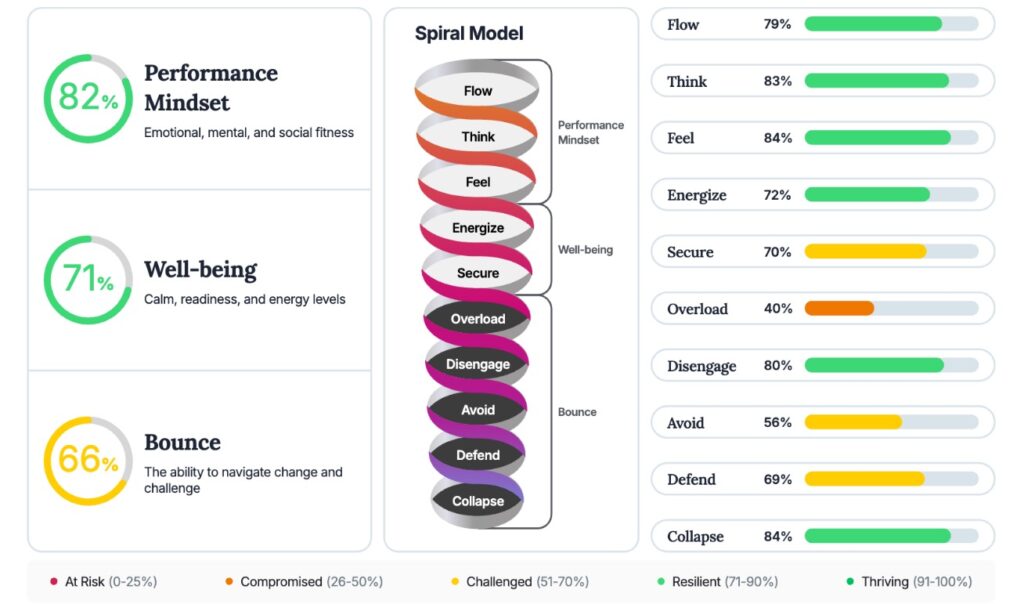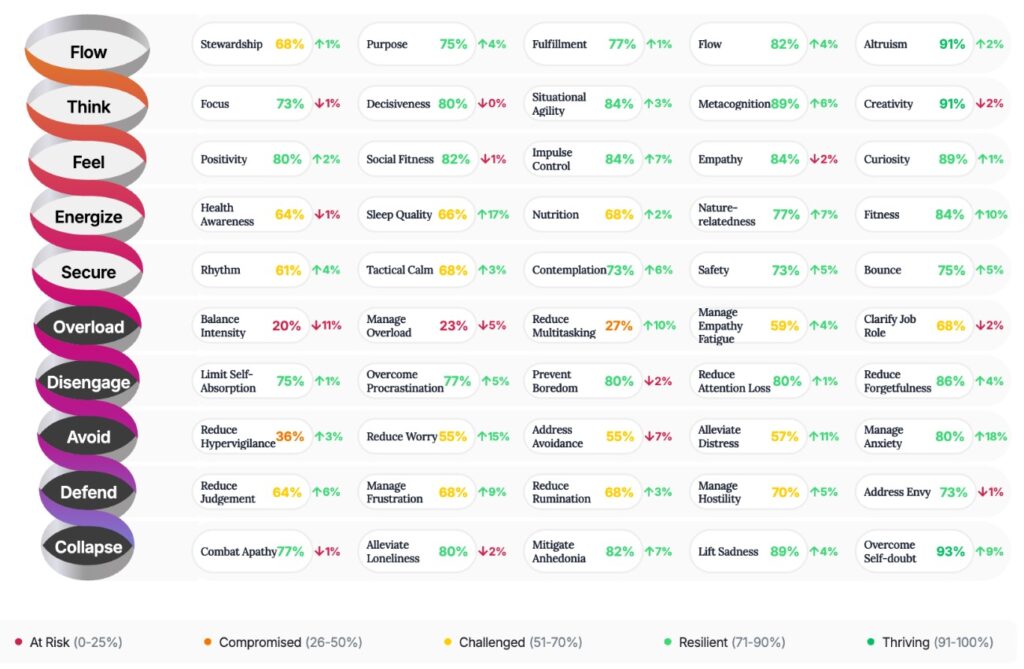Resilience Coaching for Gen Z and New Leaders
They’re talented. They’re purpose-driven. They want to lead — but they’re doing it in a time of massive uncertainty.
Gen Z and early-career professionals are entering management roles at an accelerating pace. Recent data shows their promotion rates have increased significantly in the past few years, outpacing other generations during the same period (ADP Research, 2023).
And maybe that’s the point.
This generation isn’t just asking for support — they’re offering something in return: a rethinking of how we work, lead, and sustain ourselves. Their expectations around mental health, purpose, and authenticity aren’t a weakness. They’re a call to evolve. This is an opportunity for every generation to reflect on what truly matters in leadership today.
What Gen Z Leaders Are Up Against — And Why It Matters
Young leaders are not just managing tasks. They’re navigating invisible pressure from all directions. They’re expected to lead with confidence, communicate across generations, manage up and down, and perform at the pace of constant change.
They’re also facing real internal questions:
What does leadership even look like in a world this uncertain?
Is success worth it if I have to trade my well-being to get there?
How do I lead in a way that feels authentic, not performative?
Mental health is a growing concern. A 2019 study by Mind Share Partners, SAP, and Qualtrics found that 75% of Gen Z workers reported leaving roles at least partly due to mental health reasons, and nearly 60% of employees overall said they had experienced symptoms of a mental health condition in the previous year (Time).
As Business Insider recently put it, “Gen Z is increasingly opting out of traditional management roles to maintain better work-life balance and protect their mental well-being.”
Coaching isn’t just a nice-to-have for this generation. It’s a resilience intervention.
Why Building Resilience Isn’t About Toughness for Emerging Leaders
One of the biggest mistakes we see in organizations today is the expectation that younger leaders should simply toughen up. That they should lead the way others did. That they need a thicker skin.
But resilience isn’t about becoming harder. It’s about becoming wiser. More self-aware. More grounded. More able to pause and choose how to respond.
That’s where coaching makes the difference. A skilled coach helps young professionals move from anxiety to agency. From reacting to reflecting. And that shift changes everything.
Tip: Start with a resilience conversation, not a performance review.
Teach Resilience as a Skill, Not a Trait
Resilience isn’t something you’re born with. It’s something you build. Yet most emerging leaders have never had it broken down for them — let alone measured.
Our research shows that resilience includes focus, recovery, energy, empathy, adaptability, emotional regulation, and a strong sense of purpose. These aren’t vague ideas. They’re measurable, trainable human capacities.
Tools like the Resilience Assessment allow young leaders to see where they’re strong, where they’re at risk, and how to grow with intention.
Coaching works best when it’s paired with insight. Resilience becomes real when it’s visible.
Why Traditional Feedback Doesn’t Work With Gen Z Leaders
If you’re working with Gen Z, here’s one thing to know: the old feedback loop often fails.
Feedback triggers stress. It puts people on the defensive. Instead of encouraging growth, it can cause withdrawal. As Dr. Marcia Reynolds said on the Resilience Podcast, “Feedback triggers the same stress response as a police car pulling up behind you.”
Instead of critique, choose curiosity. Ask questions like:
What are you trying to achieve here?
What do you want to do differently next time?
How can I support you?
Tip: Stop telling them how they’re doing. Start helping them think more clearly.
Coaching Emerging Leaders to Thrive in the Age of AI
The last time the world changed this fast, it was called the Industrial Revolution. Now it’s artificial intelligence.
For emerging leaders, AI brings enormous opportunity — and deep uncertainty. What happens to my career when the skills I’m learning today are automated tomorrow?
As NVIDIA CEO Jensen Huang put it, “You’re not going to lose your job to AI. You’ll lose it to someone who uses AI.”
This is where resilience coaching becomes essential. The skills that AI can’t replicate — emotional agility, presence, intuition, trust-building — are the ones organizations will rely on most.
Tip: Ask, “What strengths do you want to double down on because no machine can do them for you?”
How Coaching Builds Psychological Safety
Emerging leaders don’t want to pretend they have all the answers. And they don’t trust people who act like they do.
Coaching offers a rare kind of space. One where they don’t have to perform. Where they can think out loud. Where they can be real without feeling weak.
Psychological safety isn’t just a culture buzzword. It’s a condition for growth.
Coaches aren’t just mirrors. They’re guides through uncertainty.
Resilience Coaching Is the Leadership Development Gen Z Actually Wants
Forget outdated leadership pipelines. The next generation is asking for something different: development that’s real. Not performative. Not perfection-driven. Not productivity for productivity’s sake.
They want space to grow, tools that work, and coaches who meet them where they are.
This isn’t about lowering the bar. It’s about raising the relevance.
The organizations that understand this will be the ones that attract, retain, and grow the leaders we’ll all need in the years ahead.
We Care for Coaches: Try the Resilience Assessment (limited time offer)
If you are a coach, this is your chance to pause and check in with yourself. As part of our “We Care for Coaches” campaign, we’re offering free access to our Resilience Assessment until May 31.
This science-backed tool measures 50 key factors that shape your well-being, stress recovery, focus, emotional agility, and performance. It takes less than 10 minutes to complete and provides you with a personalized report — plus practical resources to help you strengthen your resilience where it matters most.
Your anonymous results will also contribute to our first Global Report on Coaches’ Well-Being, helping us better understand and support the coaching community worldwide.
Explore Our Certifications
If you’re ready to support the next generation of leaders with clarity, evidence, and presence, explore our Resilience Coach Certification and other programs designed to help you lead the way forward.












